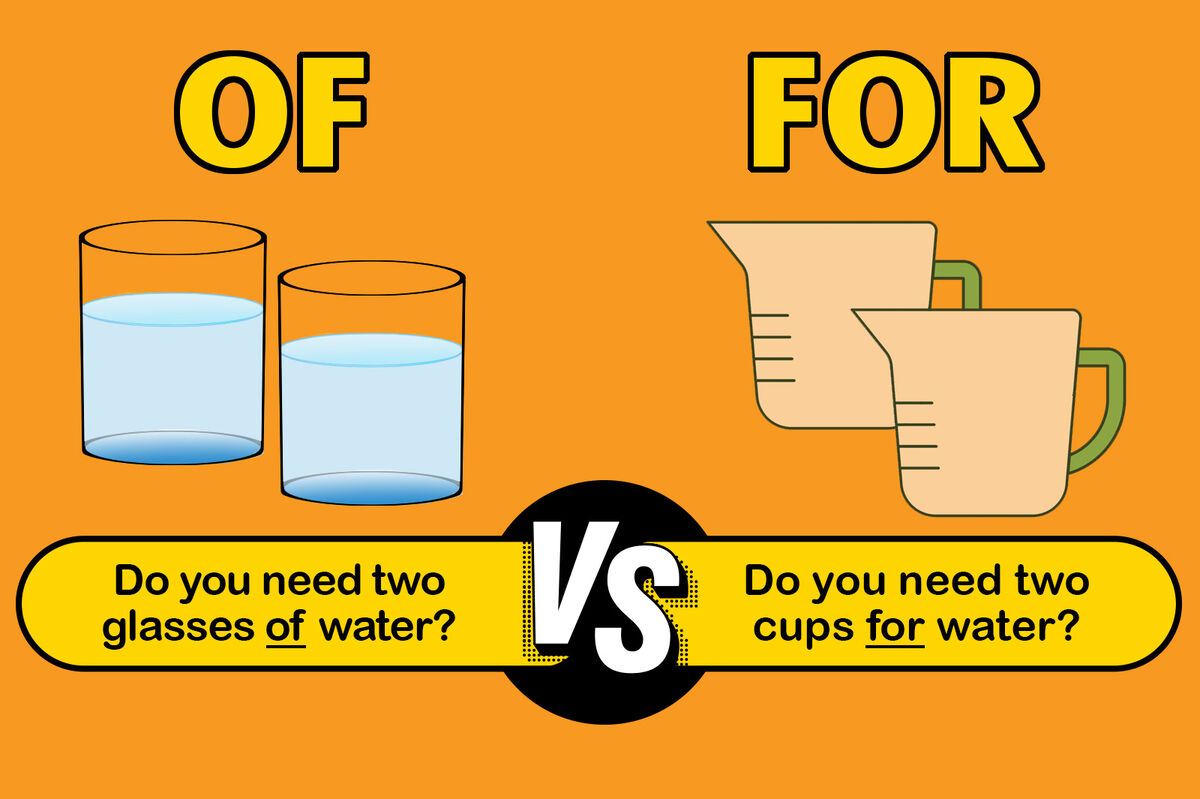
The words of and for are commonly used prepositions with very different sounds. Despite their differences, many people get them confused in sentences. Once you learn the subtle differences between of and for, you’ll know exactly when to use each word.
The Preposition Challenge
Since of and for are both prepositions, you can’t differentiate them by part of speech alone. A preposition is a relationship word that links verbs, nouns, pronouns, and phrases together in one sentence.
Preposition Rules
Before you can use these prepositions properly, you need to know the rules for prepositions. The rules that apply most to the use of for and of are:
- A noun or pronoun always comes after a preposition, but a verb never can.
Correct: That chocolate was for Mom. “ (“Mom” is a noun.)
Incorrect: That chocolate was for to eat. (“To eat” is a verb.) - Prepositions are rarely placed at the end of a sentence.
Correct: Is that the best song you ever heard?
Incorrect: Is that the best song you ever heard of? (“Of” doesn’t need to be there.)
A preposition like of or for can end a sentence if it needs to be there for the sentence to make sense.
- Correct: That's what dreams are made of.
Incorrect: That's what dreams are made. (The sentence refers to what a dream derives from. If you remove “of,” the sentence is incomplete.) - Correct: That's what rules are made for.
Incorrect: That's what rules are made. (The sentence refers to the rules’ purpose. If you remove “for,” the sentence is incomplete.)
What Does Of Mean?
There are several similar ways to define of. In general, the word of is defined as:
To indicate ownership or distance from something; derived or resulting from something
Of is used for something that belongs to or relates to something else or to reference something.
Examples Using Of in a Sentence
Keep in mind that of should always be followed by a noun or a pronoun since it is a preposition.
The Duke of Cambridge is here.
The Duke is from Cambridge.
We might die of hypothermia.
Our death might result from hypothermia.
The paintings of Georgia O’Keefe often feature flowers.
The paintings belong to Georgia O’Keefe.
She lives west of the lake.
Her house relates to the lake, because you’d travel west from the lake to get there.
He was robbed of his money at gunpoint.
The money belonged to him.
The top hat is one of his favorite accessories.
The hat belongs to the collection of accessories that he favors.
Can you get me two cups of milk?
The measurement, two cups, relates to the ingredient, milk.
What Does For Mean?
Like of, there are many similar ways to define for. In general, the word “for” means:
The purpose/reason, destination, recipient, or amount of something
Examples Using For in a Sentence
Keep in mind that for usually indicates a purpose.
Is that cookie for me?
I’m asking if I am or will be the recipient of the cookie.
We could substitute white fish for crab meat.
The purpose of the fish is to replace the crab meat.
She is speaking for him.
The reason she’s talking is because he can’t or won't.
We protest for climate change.
The purpose of the protest is to promote climate change awareness.
That vigil was for the people who died in the fire.
The recipients of the vigil were the people who died.
Did you look in the drawer for your glasses?
The reason why you would look in the drawer is to find the glasses.
For Valentine’s Day I always buy chocolate.
The purpose of buying chocolate is Valentine’s Day.
He saved a seat for his best friend.
The person who gets the seat is his best friend.
Comparing Of vs. For Usage
Now that you have a good idea what each word means, take a look at how using of or for interchangeably can change the meaning of a sentence.
I want books made for children.
The purpose of the books is to be appropriate for children to read.
I want books made of children.
Actual children make up the cover and pages of the book.
Do you need two cups of water?
The two cups are filled with water.
Do you need two cups for water?
The two empty cups might be used for holding water.
The Of vs. For Difference
While using of and for interchangeably might sound okay sometimes, it’s usually not the proper way to use the prepositions. Check out more preposition examples to help you see how to use words like of and for. You can also test yourself with preposition worksheets and preposition games.